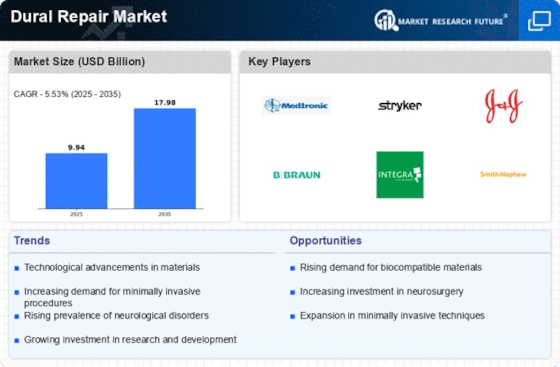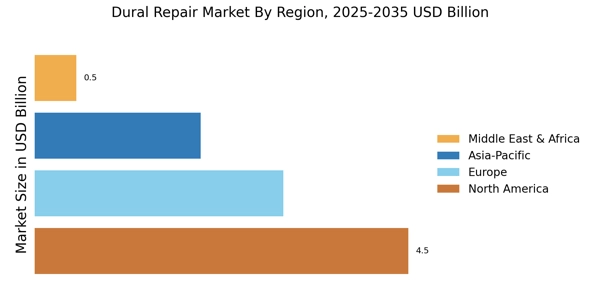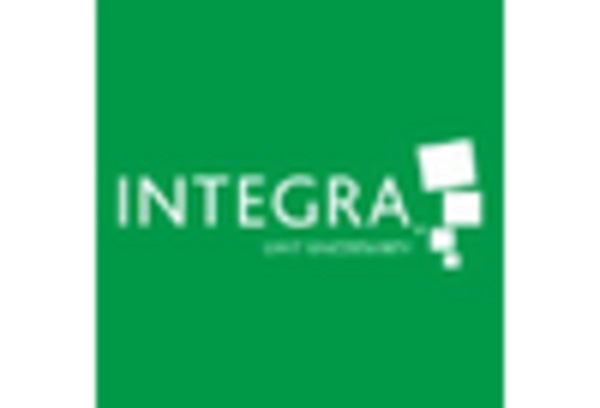Increased Focus on Patient-Centric Care
The Dural Repair Market is witnessing a shift towards patient-centric care, which emphasizes the importance of individualized treatment plans. This trend is driven by a growing awareness among healthcare providers about the need to tailor interventions to meet the specific needs of patients. As a result, there is an increasing demand for dural repair solutions that are not only effective but also consider the unique circumstances of each patient. This focus on personalized care is likely to encourage manufacturers to innovate and develop products that cater to diverse patient populations. Additionally, the rise of patient advocacy groups is contributing to this trend, as they push for better treatment options and outcomes. The emphasis on patient-centric care is expected to shape the Dural Repair Market, leading to more targeted and effective solutions.
Rising Incidence of Neurological Disorders
The Dural Repair Market is experiencing growth due to the increasing prevalence of neurological disorders such as traumatic brain injuries and spinal cord injuries. According to recent data, the incidence of these conditions is on the rise, leading to a higher demand for effective dural repair solutions. As healthcare providers seek to improve patient outcomes, the need for advanced dural repair techniques becomes more pronounced. This trend is likely to drive innovation in the market, as companies develop new products and technologies to address the specific needs of patients suffering from these disorders. Furthermore, the aging population is contributing to this increase, as older individuals are more susceptible to neurological issues. Thus, the combination of rising incidence rates and an aging demographic is expected to significantly impact the Dural Repair Market in the coming years.
Growing Investment in Healthcare Infrastructure
The Dural Repair Market is benefiting from the growing investment in healthcare infrastructure across various regions. Governments and private entities are increasingly allocating funds to enhance healthcare facilities, which includes the procurement of advanced surgical equipment and materials for dural repair. This trend is particularly evident in emerging markets, where the demand for quality healthcare services is rising. As hospitals and surgical centers upgrade their facilities, the need for effective dural repair solutions becomes more critical. Furthermore, the establishment of specialized neurosurgery centers is likely to create additional demand for dural repair products. The influx of investment in healthcare infrastructure is expected to bolster the Dural Repair Market, as it enables healthcare providers to offer better services and improve patient care.
Regulatory Support for Advanced Medical Devices
The Dural Repair Market is experiencing favorable conditions due to regulatory support for advanced medical devices. Regulatory bodies are increasingly recognizing the importance of innovative dural repair solutions and are streamlining the approval processes for new products. This support is crucial for manufacturers looking to bring their innovations to market quickly. As regulations evolve to accommodate advancements in technology, companies are likely to invest more in research and development, leading to a wider array of options for healthcare providers. Furthermore, the establishment of clear guidelines for the use of new materials and techniques in dural repair is expected to enhance safety and efficacy. This regulatory environment is anticipated to foster growth in the Dural Repair Market, as it encourages innovation while ensuring patient safety.
Technological Advancements in Surgical Techniques
The Dural Repair Market is poised for expansion due to ongoing technological advancements in surgical techniques. Innovations such as minimally invasive surgery and robotic-assisted procedures are transforming the landscape of dural repair. These advancements not only enhance surgical precision but also reduce recovery times for patients. For instance, the integration of advanced imaging technologies allows surgeons to visualize the dural layers more effectively, leading to improved outcomes. As these technologies become more widely adopted, the demand for specialized dural repair products is likely to increase. Additionally, the development of new surgical instruments tailored for dural repair procedures is expected to further stimulate market growth. The combination of improved surgical techniques and the introduction of cutting-edge tools is anticipated to drive the Dural Repair Market forward, creating new opportunities for manufacturers and healthcare providers alike.

















